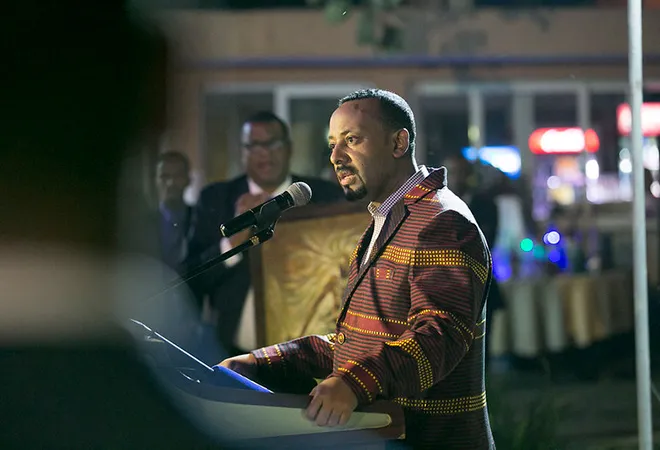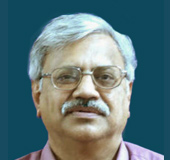
The National Election Board of Ethiopia (NEBE), on 10 July 2021, declared results of the national elections conducted on 21 June 2021, in Ethiopia. Prime Minister Abiy Ahmed’s Prosperity Party (PP) has secured a landslide victory; out of 436 contested seats, the PP has won 410 seats, but the results of only 448 seats have been declared so far. Although the Parliament has 547 members, elections could not be conducted in the remaining constituencies owing to logistical reasons. Further, the electoral process was also marred by violence and strife in certain areas. Thus, the entire picture would emerge only in September when all the constituencies send their representatives to Parliament. Nevertheless, owing to the overwhelming majority of the PP, Abiy Ahmed, who assumed power in April 2018, has secured the mandate to rule for the next five years.
It needs to be underlined that the elections have been held only in 400 out of 550 districts. In the process, the disenfranchised voters, so far, have emerged as trenchant critics of the Abiy regime.
Irrespective of this spectacular victory, Ethiopia — the second most populous country in Africa with over 110 million people — appears to be most polarised at this juncture. Its people with diverse languages, regions, and religions entertain multiple histories and notions of the idea of Ethiopia. Evidently, to strike a balance between the current ethno-national federation and different regional units in a socially complex and plural setting has been proving to be a daunting task. Apparently, the Ethiopian elections fulfilled all the prerequisites of an electoral democracy, with 47 political parties, several opposition groups, civil society observers, and roughly 37 million registered voters while conducting the elections. Although Abiy’s supporters from Addis Ababa and Amhara region celebrated the successful conclusion of elections, it needs to be underlined that the elections have been held only in 400 out of 550 districts. In the process, the disenfranchised voters, so far, have emerged as trenchant critics of the Abiy regime.
In fact, after his advent to power, Abiy Ahmed has faced the electorate for the first time. In the initial years, the euphoria that surrounded his policies and actions prompted the world to perceive Abiy in a positive light. He had ousted the repressive regime of the Ethiopian People’s Revolutionary Democratic Front (EPRDF), which had controlled Ethiopia since 1991. While repudiating their repressive measures, he released political prisoners, decriminalised opposition parties, stripped officials off of power with charges of corruption, and worked towards restoration of human rights of the citizens. He coalesced the governing coalition into a single party known as the PP. Abiy also inspired confidence that the federal and multi-ethnic state of Ethiopia would function in social harmony under his leadership. In fact, the Oromo and Amhara ethnic groups together constitute almost 60 percent of the Ethiopian population. Abiy is Oromo but with mixed parentage, i.e., a Muslim father and Christian mother. Under the circumstances, he appeared as an ideal candidate who could negotiate with religious diversities and carry the socially plural Ethiopian society together.
In the initial years, the euphoria that surrounded his policies and actions prompted the world to perceive Abiy in a positive light.
What is more, Abiy succeeded in befriending traditionally hostile neighbours such as Eritrea. In fact, from 1977, Eritrea had fought a full-scale liberation struggle against Ethiopia to become a free and independent state in 1993. Furthermore, the two countries had witnessed a border war between 1998-2000. The Tigray region of Ethiopia was home to 200,000 refugees from Eritrea. Striking a peace accord with Eritrea was a feather in the cap of Abiy. While handling his foreign policy, Abiy placed emphasis on building strategic partnerships with developed countries of the European Union (EU), the US, and China. Attracting financial investments, enhancing capacity building, and bolstering security- and defence- related areas were prime drivers of such partnerships. Abiy had not merely opted to promote regional peace and economic integration but had moved to forge economic partnerships with west Asian countries such as the UAE, Qatar, and Saudi Arabia that were crucial in averting balance of payments crises. In view of the overall performance of his regime, in October 2019, Abiy was awarded the Noble Peace Prize. This prestigious prize not merely allowed him to emerge as a prominent leader of Africa but also added to his international stature. In a continent full of autocratic regimes and intra and interstate conflicts, the advent of the Abiy regime that promoted democracy and regional peace appeared to be rather unique.
Challenges faced by the Abiy regime
However, the Abiy regime while balancing between diverse contending ethnic groups has and will continue to face challenges in Ethiopia. For instance, even if due to COVID-19 the federal government under Abiy chose to postpone the general elections scheduled in October 2020, the northern region of Tigray held the regional parliamentary elections because the Tigray People’s Liberation Front (TPLF) proved to be defiant. Subsequently, the TPLF attacked a federal military base on 3 and 4 November 2020 to steal weapons. It was supposed to be a pre-emptive strike. Moreover, the ethnic Tigrayans from the federal military also began to defect towards the TPLF.
The Abiy regime resorted to swift retaliatory measures to contain the crisis by calling a cabinet meeting and declaring a six-month state of emergency in the Tigray region. The internet and phone connections were shut down and the TPLF was declared a terrorist organisation and banned. In addition to mobilising Ethiopian National Defence Forces (ENDF) of roughly 140,000, predominantly constituted by the army, the federal regime bolstered militia fighters from Amhara and South Tigray who went into western Tigray amidst the accusations of assaults on civilians. The Eritrean forces also joined hands with the federal forces. Conversely, 250,000 soldiers and militia serve under regional commanders in Tigray according to International Crisis Group. In the midst of clashes between federal forces and Tigray forces, the strife ravaged the Tigrayan economy, and society began to get weakened with every passing day.
All ethnic nationalisms have a tendency to be divisive and conflicting. They fight amongst each other as well as against the federal system.
In essence, Ethiopia has been in a state of war which has cost, by Abiy’s own admission, US $2.3 billion, involving military expenditure and associated expenditure such as repairing roads and food aid. According to the UN estimates, roughly 350,000 people suffered acutely due to food insecurity and famine. To put the TPLF into submission, the Abiy regime deployed all forms of repression. Tigray was isolated and the civilians were forced to starve to death. Such gross violation of human rights with impunity has had an international impact. The G7 countries appealed for an immediate cessation of hostilities between the federal government and the TPLF. The EU froze US $107 million budgetary support to Ethiopia and the US imposed visa restrictions on top officials on both sides of the conflict. The US also suspended a part of its US $1 billion aid package. Nevertheless, in an ongoing tussle between the two parties, by 30 June 2021, the TPLF was able to reclaim Mekelle, the capital of Tigray. The Ethiopian and Eritrean forces were routed and there was celebration all over the region. Indeed, Tigray appeared disinclined to stay within Ethiopia because the TPLF, at one stage, had controlled Ethiopia for almost three decades. However, in the end, a large proportion of its 5.5 million population, to the extent of roughly 900,000, became victims of famine which the US viewed as entirely ‘man-made.’
Besides Tigray, the Oromia region has its own grievances against the functioning of the Ethiopian polity. As the largest region, Oromia has fought for years against marginalisation of its people by launching protests and armed movements. In its bid to obtain autonomy from the federation, the Oromia Liberation Party (ORP) has indulged in violence against the federal forces and forced polling stations to be closed in the recently concluded elections. In fact, substate nationalism is an important feature of Ethiopian politics. In addition to Oromo, Tigrayan, Somali, and Sidama, the region of Amhara is also gradually witnessing the rise of substate nationalism. Such a relatively late rise of nationalism could be explained by the fact that compared to others the Amhara people suffered relatively less social, political, and economic subjugation. However, all ethnic nationalisms have a tendency to be divisive and conflicting. They fight amongst each other as well as against the federal system. For instance, Tigrayans having identified Amhara as their enemies, or each region as a unit in different times having had violent confrontions with the federal government, impedes the smooth functioning of an already fractured Ethiopian polity.
Substate nationalism is an important feature of Ethiopian politics.
Conclusion
To conclude, in spite of the landslide victory by Abiy’s PP, the challenge of keeping all the regions within a federal framework by balancing opposing forces with recurrent demands for autonomy within the federation will continue to affect democratic governance in Ethiopia. The opposition parties will continue to attack Abiy on backtracking from the promise of a healthy democracy and federal arrangements as well as violation of human rights. In substance, managing a fractious polity democratically and working towards building legitimacy in the international world would continue to pose fresh challenges to Abiy regime in the days ahead.
The views expressed above belong to the author(s). ORF research and analyses now available on Telegram! Click here to access our curated content — blogs, longforms and interviews.




 PREV
PREV


